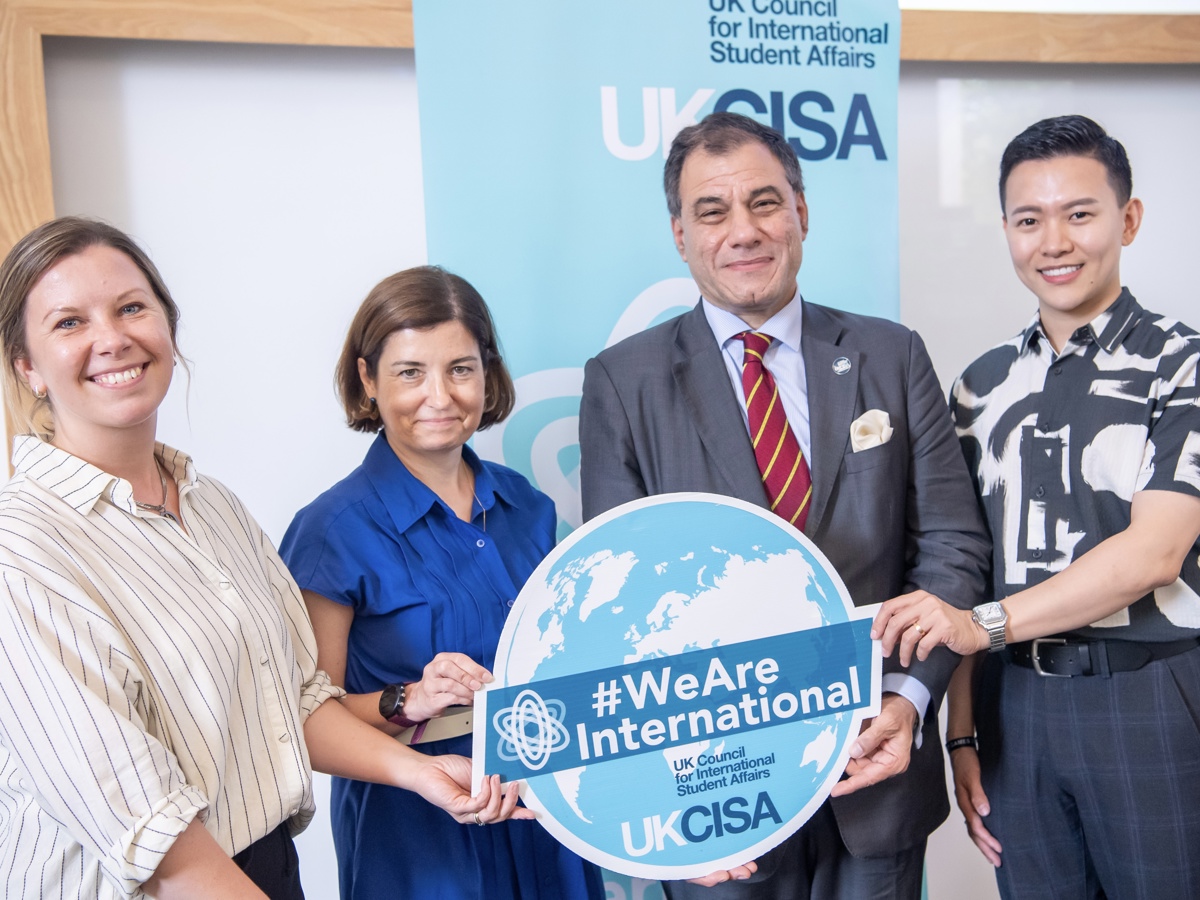
Image: UKCISA Head of Advice & Training, Heather Knight, UKCISA Chief Executive, Anne Marie Graham, UKCISA President, Lord Karan Bilimoria, and UKCISA Head of Engagement & Partnerships, Yinbo Yu (left to right)
Here at UKCISA, we are excited that our Chief Executive, Anne Marie Graham, has been nominated in the Outstanding contribution to the industry category at this year’s PIEoneer Awards.
Established by The PIE – an independent media, recruitment and events company – the PIEoneer awards recognise the best innovations and achievements, from both individuals and organisations, across the global education industry, voted on by a geographically and professionally diverse judging panel.
Read on for Anne Marie’s thoughts on her nomination, as well as her reflections on the work she and UKCISA have undertaken this year, and how her tenure as Chief Executive has coincided with a changing landscape within the international higher education sector.
How does it feel to be nominated for this award?
I know it’s a cliché, but I do feel genuinely humbled to be included in this shortlist. There are so many colleagues that I admire who have won this in the past, and who have been nominated this year, so I’m very proud to be in such stellar company. My other reaction would be ‘surprise’ – thank you for the nomination!
What does it mean for you and your work at UKCISA to be nominated for this award?
I don’t tend to think about my work as a contribution to our industry, more as how I am supporting the organisation and its mission. This nomination is an important reminder of how big a contribution UKCISA makes to the industry too. My team do an outstanding job of supporting students and members – if my contribution is recognised, it’s because they are working hard to enable that. I’ve been fortunate in my time in international education to have worked for organisations full of great people who want to make a difference, it's been a privilege to have the career I’ve had to date.
Which projects and/or areas of your work are you most proud of this past year?
The most important achievement this year (so far!) is how we worked to ensure that the Graduate route was retained. Obviously, the outcome is key, but the real success was the way the sector worked together to ensure that there was a consistent message and a body of evidence in support of the route. I’m particularly proud that UKCISA was able to work with student representative groups in this, to ensure that the Migration Advisory Committee heard directly from international students and alumni. Ensuring that the international student voice is heard, and represented, is essential – and it’s what drives me in my role as Chief Executive of UKCISA.
More recently, I’m delighted to see a real shift in the rhetoric around international students from the new government. While there is still a lot of work to be done in the policy space to support the narrative, it’s a significant step forward that is aligned to UKCISA’s policy recommendations earlier this year. I’m looking forward to working with governments across the UK to further demonstrate this commitment in the months and years ahead.
You’ve been Chief Executive at UKCISA for five years now, how has your role and work changed and evolved during your time in post?
I think the way that UKCISA represents the international student voice has been an important change. I joined the organisation just as the NUS was reducing its support for international students due to budget cuts, and I was proud to revitalise the #WeAreInternational brand by introducing our groundbreaking #WeAreInternational Student Ambassador programme. As well as ensuring that UKCISA continues to amplify the student voice in its policy and advocacy work, it has helped us to reinforce that #WeAreInternational can support and underpin so many messages relevant to current and prospective international students. I’m also proud of our work to support international graduate employability has expanded, establishing an effective cross-sector International Student Employability Group to advocate for change in a key area of the international student experience.
We’ve also had to adapt - as individuals and as an organisation - to the impact of a global pandemic. From day one as Chief Executive, I wanted to include some online training, and now it’s our principal offer. While a return to face-to-face events has been welcome, we know that online can be more inclusive and I’m glad that we have a broader offer now.
While change has an impact, what remains consistent is just as, if not more, important. UKCISA continues to be the leading expert in student immigration and fees advice, with our advice to members and students, and our market-leading training offer, making a difference to the international student experience.
I continue to be inspired by my team’s commitment to continuous improvement and ensuring that international students in the UK have the best possible experience, and to empowering our members to support that experience.
Looking forward, what are your hopes for both UKCISA and the wider international higher education sector in the coming years?
We have a new government now, one that has already outlined its message towards international students. There is still a lot of work to be done to create a policy environment that is supportive, and to shape evidence-based policy that provides a sustainable international student experience. I am focused on ensuring that we continue to support our members and students – from changes to the immigration rules, responding to operational updates as part of the government’s digital transformation agenda, or fostering messages of welcome and support for international students. Most of all, I want to continue to lead highly effective collaboration with sector partners that acknowledges each other’s strengths and expertise, and shares insight and intelligence to ensure that we influence positive political and cultural change. We’ve seen how that approach worked well to retain the Graduate route, and I hope that we can learn from that approach to face future challenges.


